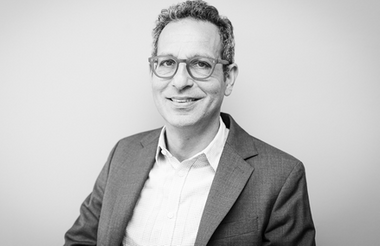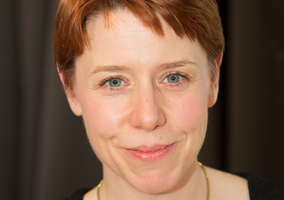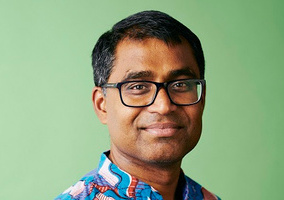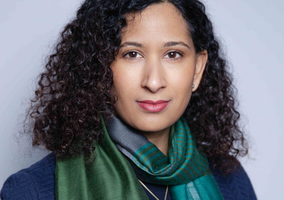Enver Solomon’s journey to chief executive of Refugee Council is “somewhat unorthodox”, as he spent the first decade of his career as a BBC World Service journalist. After becoming “disillusioned with journalism” he moved into the charity sector.
“I was a journalist who went into it to try and help change the world, to expose injustice, inequity, wrongdoing and I just felt there was less space and opportunity to do that.”
Solomon’s first roles in the sector were in prison reform, and he then moved to working with children’s charities, after deciding the reasons many people ended up in the criminal justice system were rooted in their childhood experiences. He led Just for Kids Law for nearly three years before joining Refugee Council in 2020.
“This job came up and it was really a perfect opportunity for me. There weren’t many CEO jobs I was interested in.”
Solomon, whose father’s family were refugees, says he was drawn to Refugee Council because of “personal interests, an issue that really means a lot to me” and the organisation’s “great history and standing, and [being] one that I’d always followed”.
“The opportunity to be CEO was kind of a dream come true. It sounds corny, doesn’t it? But it was like that.”
‘Some charities are very suspicious of journalists’
When he first entered the charity sector, Solomon found that it was “very suspicious and sceptical of journalists” and “the media was seen as the enemy, that was part of a right-wing establishment, who were working against charities.” As a former journalist himself, Solomon felt “very differently” and tried to get his colleagues to take a different approach.
“It’s vital that we build relationships with all media, regardless of who they are, what their background is, because it’s such an important communications channel. To be a good charity leader, or to be a charity that is very effective in trying to make an impact and advance its cause, you have to be good at communications.”
He says the sector should embrace journalists and see them as key partners, in the way funders should be seen, as part of who you need to work with to achieve your mission.
This attitude “ruffled a few feathers” when Solomon first went into criminal justice, “because people thought that I was opposing them if I said: ‘Well, there’s nothing wrong with engaging the right-wing media – it’s the right thing to do.’ And it was seen as quite controversial. I think it still is sometimes in the sector.”
Nonetheless, Solomon says it’s a challenge as “people understandably feel that certain sections of the media are against them editorially, they don't support their cause”.
“It's about understanding that journalists are people…You have to engage with people from all walks of life and you have to take them on a journey.”
‘It is a very polarised world’
Solomon believes charities should try and reach across political divides partly because he thinks “people can change their minds and they can be open to different views and opinions”.
“It is a very polarised world and there's lots of people not interested in the opposing view and their opinions” but “there’s a whole broad mass of people” who are open to discussion, he says.
Though some subjects are contentious, such as refugees crossing the English Channel by boat, Solomon says: “I don't think it's my job as a charity chief executive to only ever talk to one political party, or to be party political.
“It's my job to talk to all politicians because there are politicians across all the political parties, which are committed to our causes, which believe in the importance of welcoming refugees and treating them with dignity and humanity and respect.”
Solomon says there are some “incredible examples of direct action” happening in the sector, though adds “there’s space for different approaches, different strategies and methodologies – it is not either or”.
“It is right for there to be different approaches to campaigning, it’s right that they also complement each other and that they work in alignment.”
He says politicians might have some differences of opinion over particular areas, but his charity’s work is not something “which is simply supported by one political party”.
“I think it's important to recognise that governments are elected, and governments have to manage competing interests.
“Charities have to be mindful of the real politics that we operate in and navigate that and balance that need to be principled, with sometimes recognising the political situation that one is faced with, and recognising that one needs to adopt sometimes a degree of pragmatism and a degree of being politically astute around how you navigate the current political climate.”
‘You have to be hopeful that the political dial will shift’
Solomon says “you’ve got to remain hopeful and optimistic” about Rishi Sunak’s focus on the asylum system as prime minister.
“Some people perceive it as a bad thing, but actually, to some extent it’s a good thing,” he says.
Solomon says Sunak will do “lots of things” with which his charity disagrees, but he is hopeful the prime minister might improve how the system operates and address a backlog of people who are “in limbo being forgotten about”.
“You have to be hopeful that the political dial will shift and that you can build wider political support and public support for your cause.” Solomon adds people’s attitudes to refugees are not as conservative as some politicians think, and that is cause for optimism.
To remain positive is something he does because “otherwise you get down a spiral of despair”, so “you have to believe that you can make change”.
“It's a tough operating environment. I’m not naïve. It's a tough political environment. But I think if we challenge ourselves, and if we’re self-critical and reflective, we absolutely can make a big difference.”
‘Learned and lived experience need to work hand in hand’
Refugee Council has made a commitment in its new strategy around lived experience and refugee involvement “because we recognise as an organisation that feels very strongly about the issue that we hadn’t done as much as we would like to do”.
Lived experience is key because one of the charity’s values is inclusion, which “means being clear on how the charity is going to give equal weight to refugee voices”.
“We don’t believe that we should become a refugee-led organisation. We believe that both learned and lived experience need to work hand in hand, and when they do you get the best results. So, it’s not about giving greater weight to one, it’s about recognising the importance of both.”
The charity has a programme of support in place “because when you don’t do that, you set people up to fail”. Solomon says: “That's what's happened previously, and we need to avoid that going forward.”
Refugee Council is thinking of adding a ‘B’ for ‘belonging’ to its equity, diversity and inclusion (EDI) work. Solomon says: “You can't just take the very transactional approach where you have indicators and policies, you have to try and take a transformational approach which is about culture.”
Solomon says staff in all teams must feel safe to talk and the charity must focus on “how we can help create that sense of safety through your organisational culture”.
He suggests that sometimes organisations make the error of adopting a transactional approach, rather than a transformational approach.
‘I'm the first CEO of this organisation from a mixed-race background’
Solomon says taking a transformational approach is “absolutely critical” to how you lead an organisation though “it's really hard to get it right and you've got to be constantly reflecting and thinking”.
“I'm the first CEO of this organisation that comes from a mixed-race background,” says Solomon. Refugee Council had a CEO in the 1980s, Lord Alf Dubs, who came to the UK as a refugee on the Kindertransport fleeing Nazi Germany, though “the organisation is over seven decades old and it hadn't had a leader that was of mixed heritage”.
“My mother is Indian, born and brought up in South Africa under apartheid. My father is a British Jew, I am mixed race. People don't know how to place me because they can't work me out, and so I'm often asked: ‘Where are you from?' When I say Manchester, ‘where are you really from’ is often asked of me.”
“I experienced racism growing up in Stockport, Manchester, and I got called a P*** more times than I can count, as a kid and as a teenager. I got stopped and searched by the police a number of times, for no apparent reason.
“Just because I've experienced racism and discrimination, that doesn't mean that I'm automatically going to get equity, diversity, inclusion and belonging right in my organisation – because my experience might be very different from someone who's experienced gender-based discrimination, or another form of discrimination, or who’s from a working-class background.”
The sector needs to look at where it’s falling short in being truly representative, he says, “and where we are falling short as a sector we need to be honest and open about that”.
“We need to think about how we address it, but in a way that reflects the importance of intersectionality.”
He says this is important so “we don’t fall into that trap of addressing one area of under representation but not doing it in a fully inclusive way”.
“It is then about their experience in the organisation. Do they feel valued? Do they feel they're supported to do their role to progress their career? Getting that all right is really challenging, but it's actually about how you build a brilliant organisation.”
‘Leading through constant change’
Solomon says there is a huge gap in the voluntary sector in that “we’ve never invested in people to lead”.
Now there is a focus on inclusion in the sector, he says “we haven't brought people into leadership or management roles who understand the notion of inclusive leadership”. He says inclusivity is “not just about metrics and addressing where there are clear gaps, but it’s about investing in your organisation, including in your management and leadership”.
Though “it's absolutely vital that you invest in people”, charities are not good at that “because we always want the money to go to those we’re working with”.
Solomon describes being a charity sector CEO as “leading through constant change”.
“There's no period anymore where there won’t be change, change is a constant – so leading through change is really the challenge.
“You have to always keep your strategy under review, in any strategy there has to be agility and flexibility because you’ve got to adjust to the operating environment.”
He says the last year has involved “constantly” reacting to events for many charity leaders, which has required striking a balance “between how you can stick to your business plans and the delivery of your strategy and how you ensure that we need to be agile and react”.
“We haven’t been able to focus on the proactive things that we want to campaign on or push forward as much, and we are determined to get that right.
“It’s really important that we’re not just in a position where we’re constantly having to react, but we’re making the case proactively for what we want to see, what we think should happen, and making the case for a different narrative and a different approach to refugees.”












